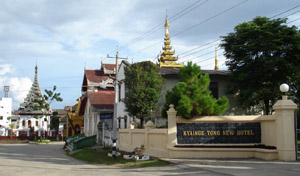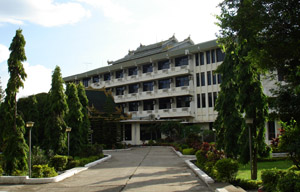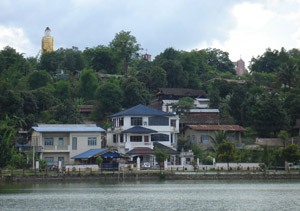 Almost 70 years ago, Maurice Collis, a former British magistrate in Burma, toured the Shan States, which included a visit to the biggest and most prosperous of them all, Kengtung. Kengtung was ruled by a royal family that traced its descent to King Mengrai, the founder of Chiang Mai. Under British rule, the Kengtung Saophas (princes) ruled semi-autonomously, administering to affairs of state from the Haw Saopha Kengtung (Kengtung Palace), which Collis also visited. Built in 1906, the Haw Saopha was a stately teak and stucco building that blended traditional Shan architecture with more contemporary European and Indian influences, the latter most evident in its distinctive minarets. The fusion of multiple cultural influence evident in the architecture of the town was noted by Maurice Collis, who wrote, "[Kengtung] was totally different from any town I had seen in the [Shan] states or in Burma. The houses were of stone or brick with tiled roofs. There was a marked air of China, though the architecture was not Chinese, nor was it Siamese, though it partook of both, and became a fusion unlike either, an individual style which must be called the Kengtung."
Almost 70 years ago, Maurice Collis, a former British magistrate in Burma, toured the Shan States, which included a visit to the biggest and most prosperous of them all, Kengtung. Kengtung was ruled by a royal family that traced its descent to King Mengrai, the founder of Chiang Mai. Under British rule, the Kengtung Saophas (princes) ruled semi-autonomously, administering to affairs of state from the Haw Saopha Kengtung (Kengtung Palace), which Collis also visited. Built in 1906, the Haw Saopha was a stately teak and stucco building that blended traditional Shan architecture with more contemporary European and Indian influences, the latter most evident in its distinctive minarets. The fusion of multiple cultural influence evident in the architecture of the town was noted by Maurice Collis, who wrote, "[Kengtung] was totally different from any town I had seen in the [Shan] states or in Burma. The houses were of stone or brick with tiled roofs. There was a marked air of China, though the architecture was not Chinese, nor was it Siamese, though it partook of both, and became a fusion unlike either, an individual style which must be called the Kengtung."
Today, Kengtung is a sleepy town, nestled 164 kilometre north of the Thai border town of Mae Sai, accessible via a winding, heavily-militarized road recently paved by the Hong Pang Company owned by Wei Hsueh-kang of the United Wa State Army (UWSA), indicted by the US Drug Enforcement Agency (DEA) for narcotics trafficking. Although there are many modern, non-descript concrete houses, many of the stone or brick structures described by Collis remain in Kengtung, especially in the centre of the town, around the Nawng Tung (Tung Lake). However, the Haw Saopha Kengtung is not one of them. It was demolished in 1991 on the orders of General Kyaw Win, now a leading member of Burma's ruling council, a casualty of development activities in preparation for the hordes of tourists the junta expected for the Visit Myanmar Year, conveniently also removing a symbol of local autonomy and culture. Local residents protested but to no avail; when they refused to take part in the demolition, the authorities simply brought non-Tai Khüns[1] and prisoners for the odious task. Two enormous chains were fastened to the minarets of the Haw Saopha and harnessed to Tatmadaw armoured personnel carriers. On the first two attempts, the chains broke; an omen, say the local residents. The Burmese succeeded on the third try.
In its place, a white, concrete-block structure topped with a green, vaguely Burmese-style roof was built and grandiosely named the Kyainge Tong New Hotel. It is by far the largest hotel in town, boasting 110 rooms spread over four floors. A concrete driveway curved up to the main entrance, adorned with a covered driveway topped with a similar green roof trimmed with Burmese-style gilded carvings. Without the faded, limp Burmese flag at the entrance and the roof, already peeling in many spots, the Kyainge Tong New Hotel could be any generic, Chinese concrete-box hotel. The reception area was unlit, staffed by a lone receptionist lounging about in boredom at the front desk. The corners of the room were adorned with several posters showing Burma's colorful "national races" and various tourist sites, local and national. Non-descript sofas and wooden seats lined one end of the room; one sofa, still brand new, was wrapped in plastic, a "do not sit" sign pasted to it, perhaps for the occasional visiting dignitary. The only other occupants here were two middle-aged men in longyis, speaking Burmese, their voices amplified in the marble-paved room.
Tong New Hotel. It is by far the largest hotel in town, boasting 110 rooms spread over four floors. A concrete driveway curved up to the main entrance, adorned with a covered driveway topped with a similar green roof trimmed with Burmese-style gilded carvings. Without the faded, limp Burmese flag at the entrance and the roof, already peeling in many spots, the Kyainge Tong New Hotel could be any generic, Chinese concrete-box hotel. The reception area was unlit, staffed by a lone receptionist lounging about in boredom at the front desk. The corners of the room were adorned with several posters showing Burma's colorful "national races" and various tourist sites, local and national. Non-descript sofas and wooden seats lined one end of the room; one sofa, still brand new, was wrapped in plastic, a "do not sit" sign pasted to it, perhaps for the occasional visiting dignitary. The only other occupants here were two middle-aged men in longyis, speaking Burmese, their voices amplified in the marble-paved room.
"This is a very good hotel," noted one with a broad grin, his teeth stained maroon by betel nut, flashing a thumbs up sign. We had just met a quarter of the hotel's current clientele.
A door led to the back garden, overgrown with various plants scattered haphazardly around a swimming pool. The light blue-tiled pool was empty save for small greenish/black puddles on the bottom. Weeds poked in between some of the tiles surrounding the pool. Several stone benches surrounded it, topped by tacky green Myanmar Beer beach umbrellas, each emblazoned with I [heart] Myanmar. I looked in vain for any building in the grounds that could have been from the old palace. There were none.
 At a nearby temple, an elderly Tai Khün man, dressed in a faded polo shirt and traditional baggy Shan trousers, grumbled, "That is the behavior of the Burmese soldiers. For those they conquer, they are ruthless, they like to show who is in control. They like to keep people poor, because it is easier to control. They are not interested in development. Just look at the roads around here. If the Thais build it," he stopped speaking, his hand gesturing back and forth evenly. "But when they build it," he paused, his hand waving up and down. "But everything they do is good, you cannot say it is bad or you go to jail."
At a nearby temple, an elderly Tai Khün man, dressed in a faded polo shirt and traditional baggy Shan trousers, grumbled, "That is the behavior of the Burmese soldiers. For those they conquer, they are ruthless, they like to show who is in control. They like to keep people poor, because it is easier to control. They are not interested in development. Just look at the roads around here. If the Thais build it," he stopped speaking, his hand gesturing back and forth evenly. "But when they build it," he paused, his hand waving up and down. "But everything they do is good, you cannot say it is bad or you go to jail."
"If it [the Haw Saopha] was still here, it would be one hundred years old now," wistfully sighed another similarly attired, elderly Tai Khün man, as he swept leaves around a spirit house nearby. "They should have kept it for tourists. Nobody really stays at that hotel. It's haunted you know, ghosts come when people are asleep, enter their heads, and makes them weak. Most guests never come back."
Gingerly navigating the unlit streets, I walked past the hulk of the Kyainge Tong New Hotel, even more forbidding after dark. The only lights visible were on the second floor of the four-storey building, and then, mostly on the shared balcony at the ends of the floor. Only one room in the side facing me was illuminated; the upper two floors were left completely dark, abandoned to the lonely ghosts and restless spirits. Before long, the solitary light flickered off, plunging the junta's "development project" into the surrounding night.
[1] Although situated in Shan State, the majority of Kengtung's population, including the royal family, is actually Tai Khün, said to be descendents of migrants from Chiang Mai. The language is close to Shan and northern Thai, and the Khün script bears close resemblance to ancient Lanna script.


